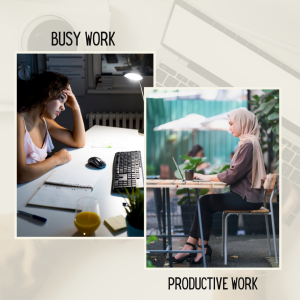Most people commonly complain that they have lots of things to do with little time to accomplish them. How many of us wish that there were more than 24 hours in a day?
Not having enough time to do the things you want, time for your family, or what your work wants you to do, is one of the most common contributing factors to persistent or chronic stress.
 People also spend their little free time fretting over the things still left undone. Thereby missing out on an enjoyable relaxation, and further keeping themselves in a chronically stressed state. When you feel like you’re running in a hamster wheel, a great first step to master is effective time management.
People also spend their little free time fretting over the things still left undone. Thereby missing out on an enjoyable relaxation, and further keeping themselves in a chronically stressed state. When you feel like you’re running in a hamster wheel, a great first step to master is effective time management.
To effectively overcome the adverse effects of stress, you need to learn techniques that have improved the lives of others. Here are a few of my time management basics to help you live a more calm and balanced life.
Time Management Tip 1: Know Your Priorities
Many people do not know when to say no or are unable to do so.  Then, they find themselves being over-scheduled as they keep on adding tasks to their to-do list. In turn, they end up working on weekends and after hours and becoming more and more resentful. The quality of work provided because of the time crunch would show in the delivery of the tasks or it may never even get finished.
Then, they find themselves being over-scheduled as they keep on adding tasks to their to-do list. In turn, they end up working on weekends and after hours and becoming more and more resentful. The quality of work provided because of the time crunch would show in the delivery of the tasks or it may never even get finished.
As a recovering people pleaser, I really struggled to say “No” because I want to be as helpful as possible.  When I was in college they had a volunteer extravaganza where all the non-profit organizations came and shared what they do. Then, Of course, they invited you to all the different events and volunteer opportunities. I struggled to say no.
When I was in college they had a volunteer extravaganza where all the non-profit organizations came and shared what they do. Then, Of course, they invited you to all the different events and volunteer opportunities. I struggled to say no.
So, I ended up overcommitting to too many volunteer opportunities which led me to going back and say that I didn’t have the time. This was not a good feeling.
Therefore, it is CRITICAL to begin listing your priorities.
Questions to consider helping you identify your priorities:
- Does this align with what I care most about?
- How will this contribute towards my overall goal or goals?
- If I prioritize this, how will my life be affected?
- If I do NOT prioritize this, how will my life be affected?
Reflecting on these questions can help you pinpoint what is exactly most important to you.
Don’t forget when you start listing your priorities, don’t only list your work-related tasks. Make sure to include those activities that you need to do with your family and friends. Aim to achieve a work-life balance that reflects what you want.
Time Management Tip 2: Value both Rest and Sleep
One of the most common problems of people who lack time management skills is sleep deprivation.  Excessive workloads and over-commitments have led the importance of sleep to be devalued and unappreciated. Adequate quality sleep every night is essential for even average focus and concentration, to maintain efficiency and productivity.
Excessive workloads and over-commitments have led the importance of sleep to be devalued and unappreciated. Adequate quality sleep every night is essential for even average focus and concentration, to maintain efficiency and productivity.
It is well-known that the body restores and repairs itself during sleep. Recent research indicates that those who don’t get a full 8 hours minimum of sleep have a higher risk of developing Alzheimer’s Disease later in their life. Lack of sleep and rest can lead to higher feelings of stress and anxiety. It may affect you in ways you don’t even notice, especially if you’re always on the go. Therefore, getting enough rest and sleep is critical to your overall well-being.
However, rest and sleep are two different things. While you are sleeping you can also be resting. However, when you’re resting it does not mean you’re sleeping.
 Rest can include many other different types of activities that are aimed at increasing physical and mental well-being. For example, rest can be a simple meditation to help you feel more peace and calm. Check out this 3 Part Breathing Meditation that can help you invite in more rest and relaxation.
Rest can include many other different types of activities that are aimed at increasing physical and mental well-being. For example, rest can be a simple meditation to help you feel more peace and calm. Check out this 3 Part Breathing Meditation that can help you invite in more rest and relaxation.
It could also be as simple as taking time to listen to music, read, or even shower. Engaging in activities that help relax the mind and body will assist in energizing and rejuvenating the body later.
We were never meant to be on the go 24/7. Listen to your body. Take time to rest and get enough sleep to help you manage the time more effectively when you’re awake. This in turn will help your body stay resilient with stress.
Time Management Tip 3: Map Your Activities
Many people fall into a time management trap because they do not have a clear list of things they do on a daily basis. They often find themselves wondering where their time goes. Not taking the time to sit down and map out your daily activities you will have a greater tendency to overestimate or underestimate the time you need to set aside for each task or activity.
Consequently, you become overcommitted, with very little or no time to spend with your loved ones, and end up feeling inadequate and resentful.
This is why it is so important to be able to effectively estimate how long each of your activities take. However, I’m not saying you need to map everything down to the minute but a rough estimate of time is always a good baseline.
Working in public accounting, we always had to prepare a budget of both the time and financial cost to the client before we started a project. This was so managers could determine who and what resources we’d need and for how long.
At least that is how it was supposed to work. Oftentimes, in public accounting, we’d “eat” hours because there was never enough time in the budget. To “eat” hours meant to not charge your client or record for that time. This was because it took a lot more work to explain why you didn’t meet the budget instead of just “eating” the hours. However, this would then create a vicious cycle. Teams would eat hours and then managers would expect the amount of budgeted hours and time to be enough. As a result, this led to many stressful, long, and late nights.
I do not recommend “eating” hours and I am not saying this is the case in all projects in public accounting. However, this was relatively common at the firm I worked at. The best solution is to be realistic with how long assignments take and maybe even to add a bit of extra time just in case. This will save you so much stress and headaches in the end.
Knowing how long your activities take can also help you to learn where you can improve or if there’s a better way to do things. A great way you can start doing this is to try a time audit. Look at what regular activities you are doing now and see how long they take. It may take a little time in the beginning, but it will be well worth your time and energy to know how you’re spending your time in the future.
Time Management Tip 4: Be Smart at Work
 Being busy does not automatically equate to being productive. Spending too much time on something does not guarantee that you will be able to achieve more. Whatever it is that you are working on you should always balance quality and quantity. Focus on the results, not only on being busy.
Being busy does not automatically equate to being productive. Spending too much time on something does not guarantee that you will be able to achieve more. Whatever it is that you are working on you should always balance quality and quantity. Focus on the results, not only on being busy.
Look for ways to perform tasks efficiently and never assume that the way it has always been done is the best way. Small improvements add up and over a day can be the difference between being stressed or not.
If you find yourself stuck just being busy and never getting anything done, be sure to check back at your priorities (Note: Use the questions above to guide you in identifying your priorities).
Time Management Tip 5: Work with Your Goals in Mind
In time management, always ensure that your daily tasks is in the same direction as your goals in life. Think about what are your goals and what you plan to achieve in your career and personal life. All these things should serve as your guiding principle on how you are going to spend each hour of your day.
 With your goals in mind, it will become easier for you to manage your time, plan for your activities and work on your short-term and long-term goals. A major component of personal happiness is knowing and feeling that your daily activities are in tune with your long-term goals.
With your goals in mind, it will become easier for you to manage your time, plan for your activities and work on your short-term and long-term goals. A major component of personal happiness is knowing and feeling that your daily activities are in tune with your long-term goals.
Conversely, if your short-term goals are not moving you towards your long-term goals, your subconscious mind will recognize this discordance and sabotage your best efforts. All this will of course, add to your feeling less in control and more stressed.
Leave a comment down below on the tip that you think is most helpful in better managing your time and stress. If you’re interested in learning more, be sure to check out my Facebook Group – A Pathway to Peace for more ways you can reduce stress and live a more joyful life.


